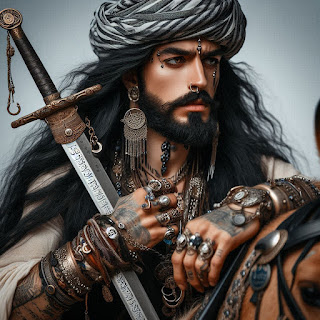Fall of the Sokoto Caliphate
In 1902, under Caliph Abderrahman Dan Abi Bakar, the British led
by Lord Frederick Lugard took advantage of the disagreement between Emirs in
the south of the Caliphate. The Emirs were pitted against themselves and this
prevented them from having any defense against the British troops. The last
Caliph, Attahiru 1, came to the throne after the death of Abderrahman Dan Abi
Bakar on the 13th of October, 1902. Due to the disagreement in the south of the
Caliphate, the British were able to take over parts of the Caliphate and were
now ready to launch a full scale attack on the capital (Sokoto). On seeing
this, Attahiru 1 put together a quick defence and was ready to fight off the
British, but unfortunately, the British who had superior fire power prevailed.
Upon the defeat, Attahiru I and many of his followers fled the
capital (Sokoto) on what Attahiru I described as "hijra" to await
"Mahdi". On March 13th 1903, the Caliphate conceded to the British.
Lord Lugard abolished the Caliphate but retained the title "Sultan"
as a symbolic position in the newly formed Northern Nigerian Protectorate. Lord
Lugard also appointed Muhammad Attahiru II, the son of Attahiru I as the new
sultan.
Attahiru I began travelling through the rural parts of Sokoto,
pursued by British soldiers, but along the line many more people began to join
him. The British were concerned about his growing force and it was all brought
to an end in the Mbormi battle ground ( Near present day Gombe). Attahiru I was
killed. British soldiers beheaded him then took pictures of his head and displayed
it throughout Northen Nigeria to "Convince the diehards of the
futility of fighting".
Attahiru I was the twelfth and last Caliph of the Sokoto
Caliphate, he was of the Atiku clan, his fathers name was Ahmadu Atiku and he
reigned from 13th October, 1902 till the 13th of March, 1903.
SOURCES;
Wikipedia
LinkedIn





Comments
Post a Comment